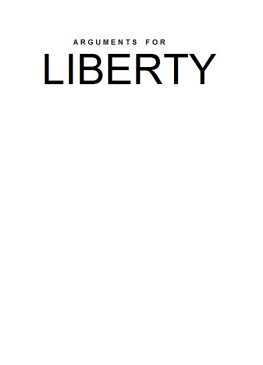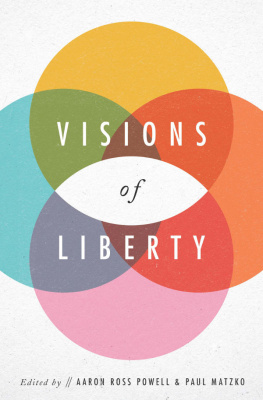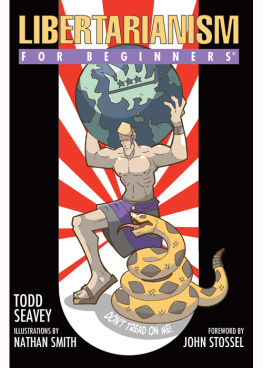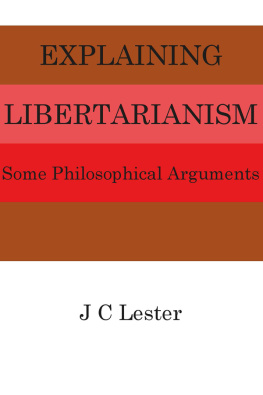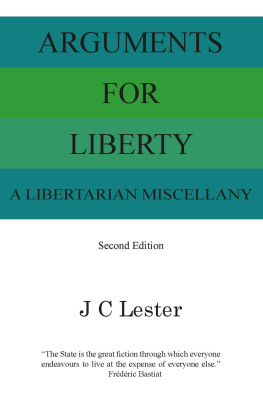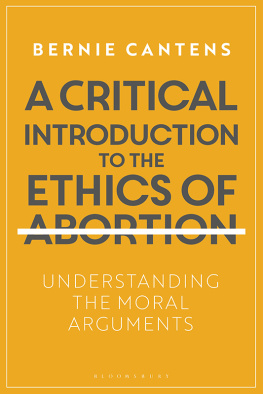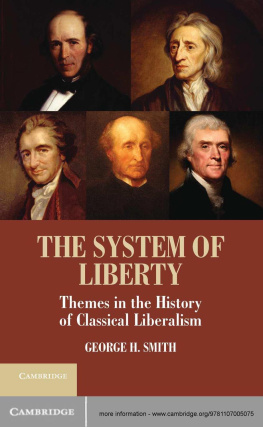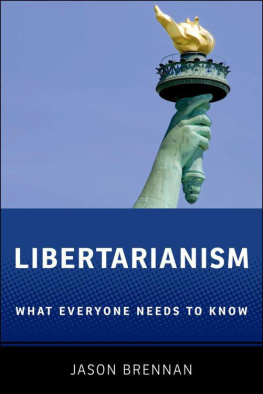
Copyright 2016 by the Cato Institute.
All rights reserved.
eBook ISBN: 978-1-944424-13-8
Print ISBN: 978-1-944424-12-1
Library of Congress Cataloging-in-Publication Data available.
Cover design: Faceout.
Printed in the United States of America.
Cato Institute
1000 Massachusetts Avenue, N.W.
Washington, D.C. 20001
www.cato.org
CONTENTS
Aaron Ross Powell and Grant Babcock
Christopher Freiman
Eric Mack
Jason Kuznicki
Jan Narveson
Kevin Vallier
Mark LeBar
Neera K. Badhwar
Michael Huemer
Jason Brennan
Aaron Ross Powell and Grant Babcock
If you value political libertyor reject it in favor of, say, material equalityyou have reasons for doing so. Your reasons might be unexamined or thought through, compelling or flimsy. When we think rigorously about the reasons we believe what we believe about morality and politics, were practicing philosophy. Practical men who believe themselves to be quite exempt from any intellectual influence, are usually the slaves of some defunct economist, wrote John Maynard Keynes.
Similarly, many people, even most people, are the slaves of some defunct philosopher. If you think your political beliefs are simply based on common sense or practicality, youre probably not digging deep enough. What seems like common sense today often turns out to be a once-controversial idea from the cutting edge of philosophy decades or centuries ago. Thus, chances are that your politics either originate with or have been thoroughly examined and articulated by some philosopher.
In this book, nine philosophers give their reasons for believing that political liberty is the most moral and just system. But they do so from within nine different schools of moral thought. Although a single best moral and political philosophy might exist, philosophers have been offering theories for at least 2,500 years and have yet to reach consensus. That doesnt mean progress hasnt been made. As libertarian philosopher Robert Nozick reassuringly said, There is room for words on subjects other than last words.
We assembled this book for two reasons. First, because freedom matters. We are convinced that the only just political order is one that enshrines liberty to the highest good. Second, because philosophy matters. Libertarianism without philosophy is libertarianism without foundation. Without principle. Its not enough to have reasons for ones political views. We need to understand those reasons, to examine them, to critically evaluate them. We need to appreciate not only why people might reject political liberty, but also why those who embrace it do soespecially when they disagree on reasons and foundations. Libertarians often argue about philosophy. Recognizing and understanding the source of libertarians differences helps us to better appreciate what it is they hold in common, and reveals weaknesses that might otherwise lie undiscovered and unaddressed. Having a more robust understanding of the philosophical foundations of liberty will better enable those of us who seek to promote it to engage with our critics. And for libertys critics, better understanding the moral foundations of liberty will help you argue more fruitfully and avoid straw men.
Arguments for Liberty is not an easy book, but neither is it a book only for scholars and experts. The chapters dont assume the reader has a strong philosophy background, though some are necessarily more complex than others, given the theories theyre articulating. The chapters are written to stand on their own, and they can be read in any order.
Each chapter begins by explaining its featured moral theory. Then, it traces out the implications of that theory, arguing that it is best understood to have libertarian conclusions in the realm of politics. In some cases, that conclusion isnt very controversial among academic philosophers. For example, almost everyone agrees that the moral theory espoused by Ayn Rand implies libertarianism, or at least something very close. In other cases, the opposite is true. John Rawlss moral theory, considered in , is usually thought to justify social democracy, not libertarianism.
The book begins with the simplest theory, though its simplicity is deceptive. Utilitarianism holds that the right thing to do is whatever produces the most happiness, and in , Christopher Freiman argues that, among competing political systems, libertarianism best fits the bill.
In , Eric Mack takes up natural rights. If it is true that humans, by our very nature, have certain rights that restrain how we may treat one another, then governments, just like ordinary people, must respect those rights.
In , Jason Kuznicki looks at arguably the most important philosopher since the ancient era, Immanuel Kant. Kant offered a moral theory grounded in reason and respect for the separateness and dignity of each of us. Kuznicki shows how this moral system points toward a government that does the same, namely, a libertarian one.
If we gave everyone a say in which rules should govern society, but they all had to agree on a single set, what would those rules look like? In on social contract theory, Jan Narveson shows how the rules most likely to meet that standard would be those supporting political liberty.
John Rawlss A Theory of Justice, which advanced a form of social contract theory, revitalized political philosophy in the late 20th century. Kevin Vallier shows in how Rawlss work, both in that book and in his later Political Liberalismalthough often considered antithetical to libertarianismcan actually provide a compelling case for a robust system of political and economic liberty.
Virtue ethics, explored by Mark LeBar in , is at once the oldest and youngest theory in the book. First discussed by the ancient Greeks, it largely disappeared from academic moral philosophy until its revival in the mid-20th century. Virtue ethics puts a persons character at the center of moral theory. It asks what traits enable a person to make good choices and live a good life. In the realm of politics, it asks what institutions are most conducive to this task.
Neera Badhwar discusses Ayn Rands theory of Objectivism in . Rands Objectivist philosophy holds that political liberty is the only system compatible with an appropriate understanding of the value of human life and the importance of human reason.
When facing moral questions in our everyday lives, most of us dont apply carefully constructed theories; instead, we go with what our intuition tells us. In , Michael Huemer develops this approach into a full theory of morality, known as intuitionism, and shows how our moral intuitions expose the immorality of most, if not all, of what governments do.
The book ends with Jason Brennan discussing pluralism, which can be roughly seen as a theory that says all the other theories go wrong in thinking that morality has an underlying framework. The various theories get at important truths, but morality doesnt reduce to a unitary good, value, or set of rules. Brennan argues that this imprecise but arguably more realistic account of morality gives plenty of support for liberty.
Is it a problem that the authors disagree with each other about fundamental moral questions? Are we stuck with ad hoc reasoning toward a desired conclusionin this case, libertarianism?
We can talk about right and wrong on several levels. The contributors to this volume agree, for the most part, at the level of applied ethicsif you asked them some concrete questions about specific situations or behaviors, they would answer in similar ways. They would likely agree, for example, that the state cannot legitimately ban recreational drugs, or censor a newspaper critical of the president, or conscript people into the armed forces. Yet they have disagreements. If you asked
Next page
